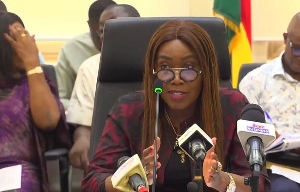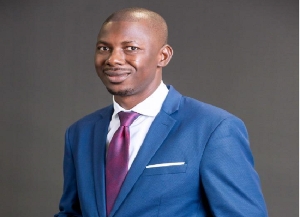- Home - News
- TWI News | TV
- Polls
- Year In Review
- News Archive
- Crime & Punishment
- Politics
- Regional
- Editorial
- Health
- Ghanaians Abroad
- Tabloid
- Africa
- Religion
- Election 2020
- Coronavirus
- News Videos | TV
- Photo Archives
- News Headlines
- Press Release
Opinions of Thursday, 17 November 2011
Columnist: Bonsu, Nana Ama
Homosexuality And The Law in Ghana: What Way Forward?
By Nana Ama Bonsu
British Prime Minister David Cameron appears to have caused far more headaches for gay people in Ghana than his ‘gay aid’ comments probably intended. The Bishop Obinim scandal sometime ago had come as welcome relief to many gays after months of incessant comment and vilification of this issue, and Mr. Cameron inadvertently stirring the hornet’s nest brought it again to the fore of national discourse, most to their consternation. The president’s defiant reply to Mr. Cameron was predictable-there was no way he could have said anything less, else he would have been roasted alive.
As a nation, we seem excellent at talking ad nauseum about issues, but lack the will to see them through for the simple reason that we have a short attention span and like jumping from one matter to another with the rage of a bull in a china shop- passionate, useless theatrics. Whether it is the annual floods, high rate of road accidents, corruption or the filth that engulfs us, we love to wheel issues out seasonally and dissect them endlessly on air until another salacious talking shop knocks them off the airwaves. We simply love scandals, especially the ones with sex to spice them up. The issue of homosexuality in Ghana is as old as the hills and this is not the first time it has hit the airwaves.
As far back as 2003, four boys were jailed by a circuit court for homosexual conduct. There was a lot of noise in the media. Then the issue came back again when the Ghanaian actress Grace Omaboe (a.k.a Maame Dokono) raised hell over it in a radio programme on a regular basis and generated plenty of public heat. Again, that passed. Then there was the famous planned ‘gay conference’ during the NPP era which generated a lot of angst but nothing more. Then there was the three-month, pre-Obinim anti-gay season earlier this year, with condemnations galore and nothing more. All these are aside several reported minor gay scandals over the years. Now we are in the dying stages of a fit of emotions over the issue. And gays in Ghana simply shrug and say ‘this too shall pass’. And pass it will, especially as the political temperature shoots up, with elections beckoning and politicians busily stabbing each other in the eye over issues on which they do not agree. After all, they agree in the condemnation of homosexuality, meaning there are no political points to score at the expense of each other. Where is the fun in that for them?
A serious country would be asking itself, so what next? Sometime ago, I argued in an article on ghanaweb.com that s.104 of the Criminal Code, the law that many people assume bans homosexuality in fact does nothing of the sort ( see http://ghanaweb.com/GhanaHomePage/features/artikel.php? ID=211710&comment=6866276#com) . Homosexuality is the sexual attraction a person has for another person of the same gender, and you cannot ban attraction so homosexuality cannot possibly be illegal. Arguably s.104 does ban anal sex as ‘unnatural carnal knowledge’ but it is very limited even in scope in that it does not cover non-penetrative acts such as male-to-male kissing, fondling or mutual masturbation. The simple reason is that under Ghanaian law, ‘carnal knowledge’, whether natural or unnatural, must involve a minimum threshold of ‘least degree of penetration’, which is further defined by penile penetration. In any event, the fixation among many seems to be on sodomy (i.e. anal sex) as the only channel of sexual expression between two men, which of course is completely wrong and misguided. Human sexuality is a very complex issue and goes beyond merely sticking bits of one’s body in this or that orifice. Lesbians are not caught by s.104 as lesbians are incapable of engaging in penile penetrative sex.
Recently a radio panellist was hotly berating the authorities for not doing anything about a club in Osu that allegedly holds gay nights on a certain day of the week, even though he raised the issue regularly on radio. He claimed that on entering the club one sees only young men dressed outrageously in tight tops and skinny jeans who are obviously gay, and that the authorities should move in and close the place down. What he failed to educate himself on was that there is nothing the police can do as a matter of law, since it is not against the law for men to dress in tight tops, skinny jeans and even walk and talk like women if they choose to. And whilst the young men may well be gay, there is nothing in the law that says that a night club must always have both sexes attending. So long as the young men were not engaging in immoral conduct in a public place ( men dancing ‘bone to bone’ is not immoral) or having ‘unnatural carnal knowledge’ as per s.104 of the Criminal Code of each other (i.e. engaging in sodomy) inside the club, the authorities cannot close the place down, unless of course they find some tax, licensing or other reasons to do so in a bid to cure the legal defect.
From media discussion in recent times, legal opinion seems settled that s.104 is very limited. In fact, on Joy FM’s Newsfile programme on Saturday 4 November 2011, the journalist Kweku Baako succinctly explained the position of the law, having done some research on this by speaking to lawyers, leaving lawyers Mike Ocquaye Jnr and David Annan, both his co-panelists, floundering on the issue. Therefore, the real question we should be asking, after all the heat and noise has died down, is whether to expand s.104’s remit, given its limited reach as explained earlier. And if we agree to reform the law, to what extent do we do so to make it effective in order to deal with intimate or affectionate acts between men that fall short of actual sodomy? This calls for sober reflection, and in my view, there are two strands here.
In banning non-penetrative acts that are intimate and sexually erotic between two men or women, even in the privacy of their rooms, this should not be difficult. Kissing each other, mutual masturbation and fondling would readily fall into this, even if done in private. Of course, since sexual matters, whether gay or straight, are usually conducted in private behind lock and key, one wonders how the police would monitor this, but that is another argument altogether.
Bu then should we go further and ban acts that on the surface may not in themselves be intimate or sexual but could thus be construed by a reasonable person? Such as two men holding hands as they stroll through town? A man sitting on another man’s laps in public? Two men slinging their arms around each other publicly? Hugging each other? A man walking down the street and swinging his hips like a woman? Young men gathering in a night club and dancing the night away?
There are clearly limits to what the law can do even if expanded to reflect the Ghanaian national mood on homosexuality. But that does not prevent a sober debate. Sweeping the matter under the carpet only to air it after the next scandal in a few months is a complete failure of leadership and a total waste of everybody’s time. We have been there several times. This collective political masturbation and occasional howls of righteous but ineffective indignation must cease. Let’s get serious for once.










